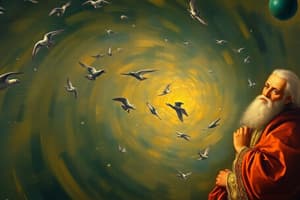Podcast
Questions and Answers
What is one of the reasons why people might attack others in the state of nature according to Hobbes?
What is one of the reasons why people might attack others in the state of nature according to Hobbes?
- To gain reputation or glory (correct)
- To seek future pleasures and comforts
- To avoid conflicts and maintain peace
- To form alliances for social harmony
How does Hobbes describe human behavior in the state of nature regarding competition for resources?
How does Hobbes describe human behavior in the state of nature regarding competition for resources?
- Individuals tend to be indifferent to others' desires
- Everyone seeks balance in resource distribution
- People cooperate to share resources fairly
- Competition leads to inevitable conflict among individuals (correct)
According to Hobbes, when is an invader most likely to attack?
According to Hobbes, when is an invader most likely to attack?
- When the opponent is significantly weaker
- When the invader feels secure in their strength
- When the opponent shows signs of weakness
- When there is no threat of retaliation (correct)
What does Hobbes imply about the nature of human beings regarding strength and power?
What does Hobbes imply about the nature of human beings regarding strength and power?
What is the primary goal that drives human action according to Hobbes?
What is the primary goal that drives human action according to Hobbes?
What role does reputation play in Hobbes' view of human interaction?
What role does reputation play in Hobbes' view of human interaction?
In Hobbes' perspective, what often happens to those with a reputation for strength?
In Hobbes' perspective, what often happens to those with a reputation for strength?
What outcome does Hobbes foresee in a situation where no one can assure their safety from invaders?
What outcome does Hobbes foresee in a situation where no one can assure their safety from invaders?
What was Galileo's revolutionary perspective on motion?
What was Galileo's revolutionary perspective on motion?
What did Hobbes equate human beings' desire for rest with?
What did Hobbes equate human beings' desire for rest with?
How did Hobbes describe the heart and nerves in relation to motion?
How did Hobbes describe the heart and nerves in relation to motion?
What is the concept of 'felicity' as described by Hobbes?
What is the concept of 'felicity' as described by Hobbes?
According to Hobbes, what inevitably leads to a 'war of all against all' in the state of nature?
According to Hobbes, what inevitably leads to a 'war of all against all' in the state of nature?
How does Hobbes define power in relation to future gain?
How does Hobbes define power in relation to future gain?
What role does Hobbes attribute to motion in human life?
What role does Hobbes attribute to motion in human life?
What did Hobbes believe about the nature of human beings in the absence of a governing state?
What did Hobbes believe about the nature of human beings in the absence of a governing state?
What does Locke identify as the primary issue within the state of nature?
What does Locke identify as the primary issue within the state of nature?
What leads to the scarcity of land according to Locke?
What leads to the scarcity of land according to Locke?
How does the existence of money change people's relationship with land?
How does the existence of money change people's relationship with land?
What does Locke propose as a solution to the growing issues within the state of nature?
What does Locke propose as a solution to the growing issues within the state of nature?
What does Rousseau criticize about earlier philosophers' views on the state of nature?
What does Rousseau criticize about earlier philosophers' views on the state of nature?
What aspect of human nature could lead to a more favorable view of life without a state, according to the text?
What aspect of human nature could lead to a more favorable view of life without a state, according to the text?
How does Locke view the eventual change in the state of nature over time?
How does Locke view the eventual change in the state of nature over time?
Which of the following statements reflects Locke's perspective on the initial abundance of land?
Which of the following statements reflects Locke's perspective on the initial abundance of land?
What does Hobbes argue is a significant source of conflict among humans?
What does Hobbes argue is a significant source of conflict among humans?
How does Hobbes define the state of war?
How does Hobbes define the state of war?
What is Hobbes's perspective on human cruelty in the state of nature?
What is Hobbes's perspective on human cruelty in the state of nature?
What criticism does Hobbes acknowledge regarding suspicion in human relations?
What criticism does Hobbes acknowledge regarding suspicion in human relations?
What behavior does Hobbes suggest reflects societal suspicion?
What behavior does Hobbes suggest reflects societal suspicion?
Which statement best captures Hobbes's view on morality in the state of nature?
Which statement best captures Hobbes's view on morality in the state of nature?
In Hobbes's view, how are humans likely to behave without the protection of law?
In Hobbes's view, how are humans likely to behave without the protection of law?
What underlying assumption does Hobbes challenge regarding human nature in his discourse?
What underlying assumption does Hobbes challenge regarding human nature in his discourse?
What does Hobbes consider as the first 'fundamental law' of nature?
What does Hobbes consider as the first 'fundamental law' of nature?
How does Hobbes suggest people should treat their rights in relation to others?
How does Hobbes suggest people should treat their rights in relation to others?
What is a simplified version of the Laws of Nature that Hobbes proposes?
What is a simplified version of the Laws of Nature that Hobbes proposes?
What problem arises from Hobbes's concept of the Laws of Nature being considered moral laws?
What problem arises from Hobbes's concept of the Laws of Nature being considered moral laws?
According to Hobbes, what is the primary reason for individuals to follow the Laws of Nature?
According to Hobbes, what is the primary reason for individuals to follow the Laws of Nature?
What apparent contradiction does Hobbes face regarding rationality in the state of nature?
What apparent contradiction does Hobbes face regarding rationality in the state of nature?
How many total Laws of Nature does Hobbes outline?
How many total Laws of Nature does Hobbes outline?
What does Hobbes suggest about the ability of most people to deduce the Laws of Nature?
What does Hobbes suggest about the ability of most people to deduce the Laws of Nature?
Flashcards are hidden until you start studying
Study Notes
Galileo's Perspective on Motion
- Objects maintain constant motion in a straight line unless acted upon by an external force.
- Importance lies in explaining the changes in motion rather than the existence of motion itself.
Hobbes' Materialist View
- Hobbes adopts Galileo's principles to argue that motion defines human beings.
- Describes the heart as a spring, nerves as strings, and joints as wheels, presuming that human movement and emotions are mechanical.
Concept of Desire and Felicity
- Individuals are in a constant search for 'felicity,' defined as ongoing success in fulfilling desires.
- This pursuit inevitably leads to conflict in the state of nature, as desires clash.
Power Dynamics in the State of Nature
- Hobbes defines power as the current means to achieve future goods.
- Conflicts arise when individuals desire the same scarce resources, leading to hostility and competition.
Reasons for Conflict
- Three main motivations for attack: gain, safety, and reputation.
- Reputation can provoke attacks even without immediate threats to one’s safety.
Human Nature and Suspicion
- Hobbes argues humans are not inherently cruel; fear drives their behavior in the state of nature.
- The readiness to fight defines a state of war, which persists even without actual conflict.
Morality and the Laws of Nature
- Hobbes asserts that natural laws exist in a state of nature to guide behavior, advocating for peace when possible.
- He discusses three fundamental laws of nature that relate to peace, mutual cooperation, and keeping agreements.
Rationality in Conflict
- Rationality leads individuals to act in ways that can cause both peace and war, depending on the context.
- Disputes over justice illustrate the challenges of maintaining order in a state of nature, compelling the need for a civil government.
Locke's Critique of the State of Nature
- Locke challenges Hobbes' view by discussing the evolution of society from an initially peaceful state of nature to one filled with disputes intensified by scarcity and the invention of money.
- He proposes that the establishment of civil government becomes crucial as disputes over resources increase.
Rousseau's Rejection of Societal Influences
- Rousseau posits that philosophers often mischaracterize the state of nature by projecting societal traits onto it.
- Advocates for a more favorable view of human nature devoid of societal corruption, suggesting humans in their natural state are not malicious.
Studying That Suits You
Use AI to generate personalized quizzes and flashcards to suit your learning preferences.




